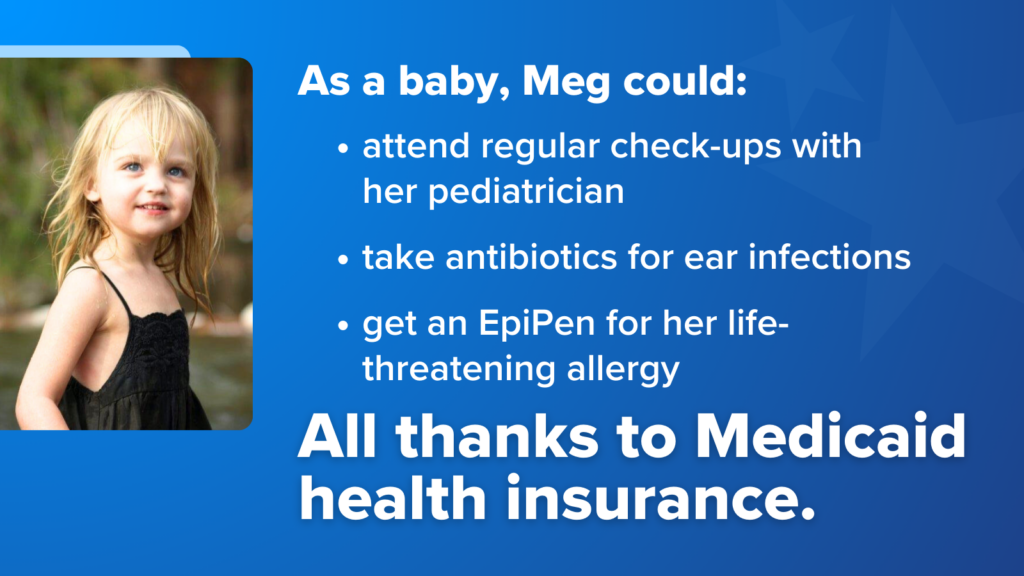
New data released by the U.S. Census Bureau’s American Community Survey confirms a troubling reality: Once again, Texas has the highest uninsured rate in the nation for both kids and adults. Without insurance, families are more likely to go without regular doctor visits or needed medications, leaving health problems unchecked.
The Census report shows that in 2024, 13.6% of Texas children and 21.6% of Texas adults lacked health insurance, both roughly double the national rates of 6.0% and 11.3%, respectively. To put this into perspective, the U.S. has about 4.6 million uninsured children — and 1.1 million of them live in Texas. This means that almost 1 in 4 uninsured children in the country is a Texan.
The new data show the children’s uninsured rate worsened in Texas, rising from 11.9% in 2023 to 13.6% in 2024. We knew that the Medicaid unwinding process would increase the number of children without coverage. That “unwinding” process was the restart of Texas and other states reviewing Medicaid eligibility, putting an end to pandemic-era rules that allowed families to keep Medicaid coverage without going through the renewal process. Looking ahead, the recent federal cuts to Medicaid and the Affordable Care Act (ACA) Marketplace raise real concerns that the uninsured rate will climb even higher in 2026, a spike that would show up in the Census Bureau’s 2027 report.
Texas continues to stand apart from our neighboring states, all of which are doing a better job connecting people to health coverage, according to the new Census data. For example, there are much lower children’s uninsured rates in Arizona (9.3%), Arkansas (7.7%), Louisiana (4.1%), New Mexico (6.1%), and Oklahoma (8.5%) compared to Texas (13.6%). Many of these states face the same challenges as Texas but have taken steps to improve their enrollment systems and find affordable health coverage options to help more adults and children get insurance — decisions that Texas has yet to make.
Health insurance is an essential piece of the puzzle for keeping kids healthy.
When children do have health insurance, families feel the difference. For example, 85% of kids enrolled in Medicaid health insurance go to their well-child checkups compared to just 56% of uninsured children. It ensures that families can catch developmental delays early and kids can bounce back faster when they’re sick so they don’t miss out on school.
While Texas has a network of resources for uninsured families, like community health centers, these clinics usually provide only preventive and basic primary care. More specialized services such as cancer treatment, children’s eyeglasses, chronic disease management, and specialty care are generally only accessible to those with insurance. Even basic care can be limited, as charity clinics often struggle to meet demand and are unavailable in many counties, particularly in rural areas.

The uninsured rate is a statewide problem, requiring statewide solutions.
The uninsured rate is not just a problem for certain communities in Texas. It affects families all across our state. The Census data show that Texans of every racial and ethnic background identified in the survey – Asian, White, Black, Hispanic, and American Indian – have higher uninsured rates than the national average. These numbers confirm that health coverage is a statewide challenge and must be addressed through statewide solutions.
About half of Texas children without health insurance are actually eligible for Medicaid, so state leaders can make significant progress simply by helping families get connected to coverage they already qualify for. Uninsured adults face a different reality, since Texas Medicaid policy currently prohibits most low-income adults from enrolling in Medicaid.
Texans deserve better. The U.S. Congress and Texas Legislature have an opportunity to connect more Texans to health insurance by focusing on practical solutions, including:
- The U.S. Congress should extend the enhanced “premium tax credits” (PTCs) to help families afford health insurance. This enhanced financial assistance, which Congress passed in 2021 and extended in 2022, has reduced monthly premiums for Texans enrolling in HealthCare.gov plans. They will expire on December 31, 2025 if Congress does not take action. Without the enhanced credits, many families could face increases of hundreds of extra dollars in monthly premiums, and around one million Texans risk losing their health insurance. (Whether or not Congress extends the enhanced PTCs, the original PTCs that have been available since the beginning of the Affordable Care Act would remain in place.)
- The Texas Legislature should use the next legislative session to strengthen Medicaid, with a focus on ensuring children who are already eligible can enroll in health coverage. This is especially important as the recent federal reconciliation bill includes concerning health care cuts, with the largest reductions targeting ACA marketplace coverage rather than Medicaid. Despite these cuts, Medicaid will continue to be the backbone of health care for Texas children, pregnant and postpartum women, people with disabilities, and low-income seniors. During the 89th legislative session this year, Texas legislators showed strong bipartisan support for helping eligible children enroll in health coverage when their parents provide affirmative consent. Specifically, the Texas House passed a “Parent Notification” bill to inform families when their children are confirmed eligible for Medicaid, but it did not come up for a vote in the Texas Senate. The bill should be a priority this interim as lawmakers prepare for the next legislative session.
- The Sunset Commission should focus on improving HHSC’s enrollment systems to ensure families can get the coverage they qualify for. The 2027 Sunset review offers Texans a chance to evaluate and improve sixteen state agencies that provide essential programs supporting children and families from health care and nutrition to child care and youth rehabilitation. State agencies just took one of the first steps to kick off this Sunset process, releasing their self-evaluation reports. The Health and Human Services Commission’s self-evaluation highlights that, while services have been consolidated, “more work is to be done to improve the customer experience,” as families still face challenges navigating eligibility offices, hotlines, and websites without a clear front door to access needed services.
- The Legislature should develop a plan for providing affordable health insurance options to adults with low-wage jobs. Since Texas has not implemented Medicaid expansion, adults with incomes below the poverty level are typically not eligible for health insurance through Medicaid unless they are pregnant or postpartum, have a severe disability, or living in a nursing home.
We look forward to working with the Legislature to take smart, statewide action that ensures more Texas children get the health care they need to grow, thrive, and succeed.



